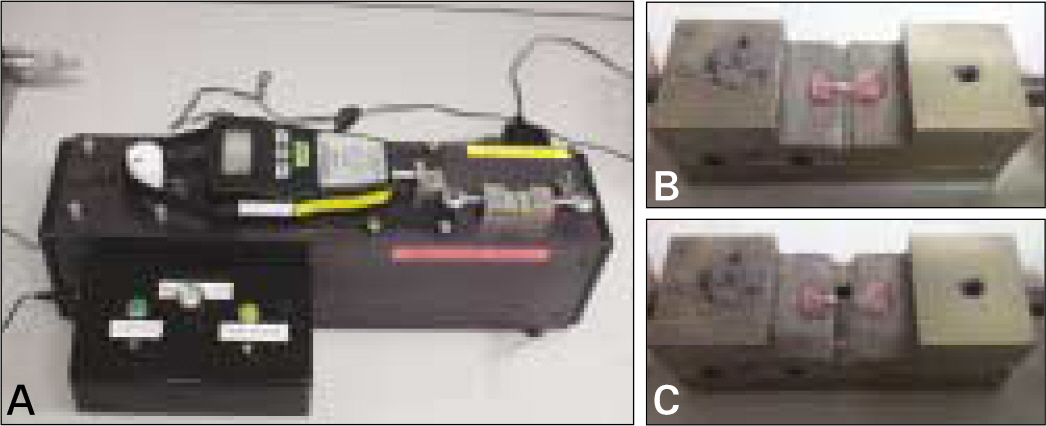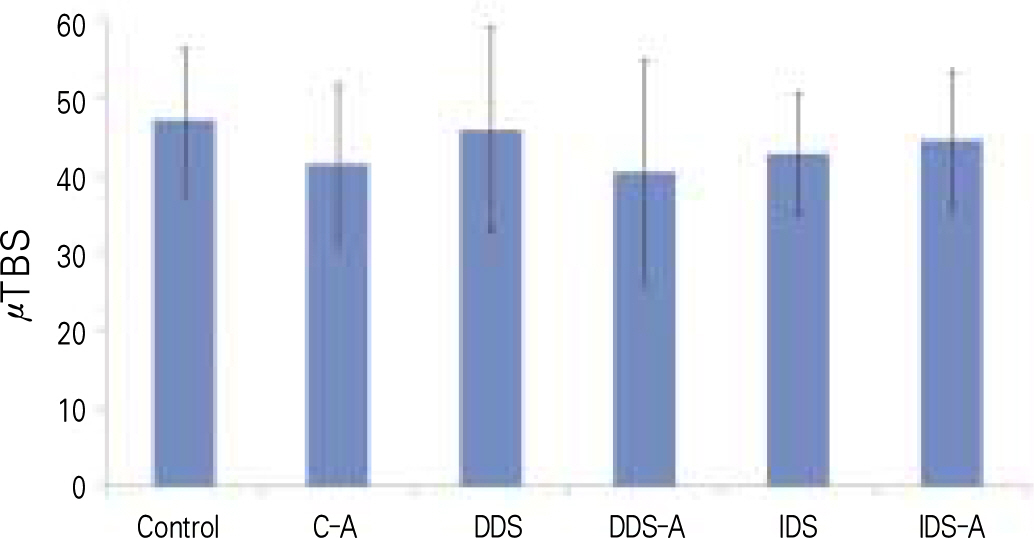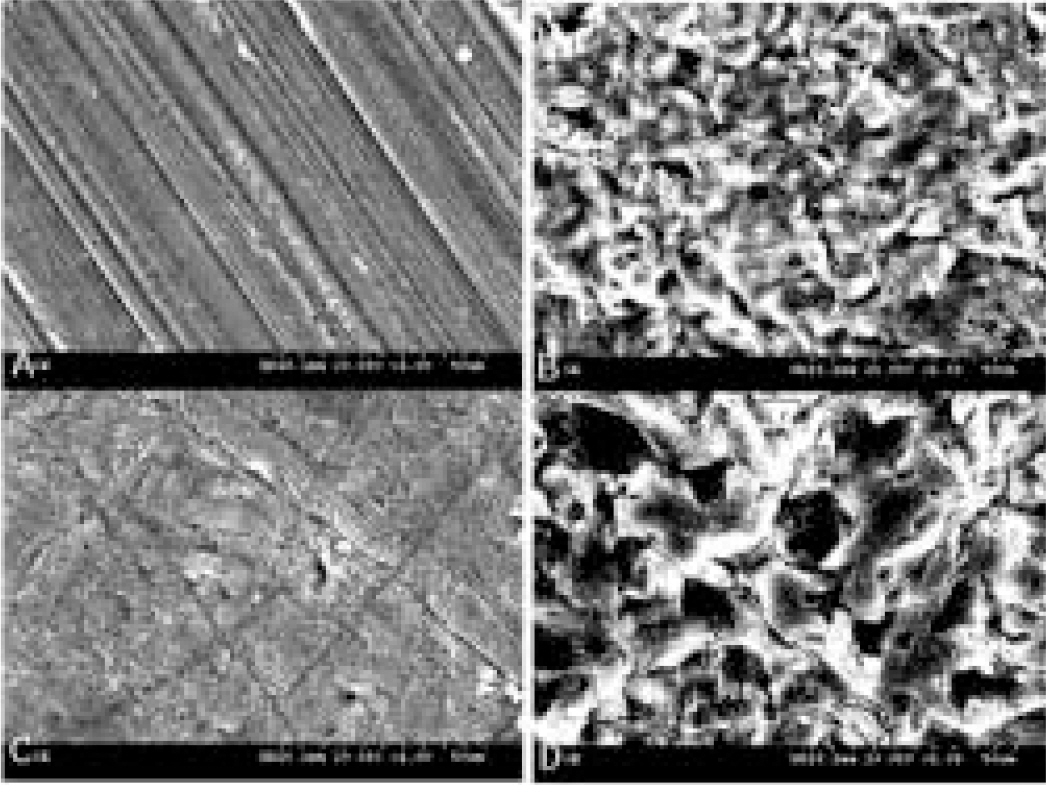J Korean Acad Prosthodont.
2010 Jan;48(1):8-15. 10.4047/jkap.2010.48.1.8.
Influence of air abrasion and different dentin sealing techniques on microtensile bond strength to dentin
- Affiliations
-
- 1Department of Prosthodontics, College of Dentistry, Yonsei University, Seoul, Korea. sunjai@yuhs.ac
- 2Department of Conservative Dentistry, Dental Hospital, Gangnam Severance Hospital, Yonsei University, Seoul, Korea.
- 3Department of Prosthodontics, Dental Hospital, Gangnam Severance Hospital, Yonsei University, Seoul, Korea.
- KMID: 2000316
- DOI: http://doi.org/10.4047/jkap.2010.48.1.8
Abstract
- PURPOSE
The purpose of this study was to evaluate the effect of various methods of dentin bonding agent application and air abrasion pretreatment on microtensile bond strength between dentin and resin, using a self-etching adhesive system. MATERIAL AND METHODS: Thirty freshly extracted human molars were obtained and divided into 6 groups of 5 teeth. A 2-step self etching adhesive system (Clearfil SE Bond) was used for all groups. The control specimens were prepared using a direct immediate bonding technique. The delayed dentin sealing specimens were prepared using an indirect approach without dentin prebonding. The immediate dentin sealing specimens were prepared using dentin prebonding immediately following preparation. Immediate dentin sealing teeth and delayed dentin sealing teeth had provisional restorations using Fermit for two weeks. Then all specimens of each group were divided into two groups of three, depending on air abrasion pretreatment. Composite "crowns" were incrementally built on and specimens were stored in water for 24 hours. All teeth were prepared for a microtensile bond strength test. Bond strength data were analyzed with a one-way ANOVA test, and post hoc comparison was done using the Scheffe's test.
RESULTS
The mean microtensile bond strengths of all groups were not statistically different from each other.
CONCLUSION
When preparing teeth for indirect restorations, IDS and DDS with Clearfil SE bond, have no difference on the microtensile bond strength between dentin and resin. Air abrasion pretreatment did not affect the microtensile bond strength when using IDS and DDS with Clearfil SE bond.
Keyword
MeSH Terms
Figure
Reference
-
1.Belser UC., Magne P., Magne M. Ceramic laminate veneers: continuous evolution of indications. J Esthet Dent. 1997. 9:197–207.
Article2.Gu ¨rel G. Porcelain laminate veneers: minimal tooth preparation by design. Dent Clin North Am. 2007. 51:419–31.3.Giachetti L., Bertini F., Bambi C. An 8-year follow-up of a fractured endodontically treated incisor restored with a modified laminate veneer. Dent Traumatol. 2008. 24:104–7.
Article4.Van Meerbeek B., De Munck J., Yoshida Y., Inoue S., Vargas M., Vijay P., Van Landuyt K., Lambrechts P., Vanherle G. Buonocore memorial lecture. Adhesion to enamel and dentin: current status and future challenges. Oper Dent. 2003. 28:215–35.5.Perdiga ̃o J., Lopes M. Dentin bonding—questions for the new millennium. J Adhes Dent. 1999. 1:191–209.6.Paul SJ., Scha ¨rer P. The dual bonding technique: a modified method to improve adhesive luting procedures. Int J Periodontics Restorative Dent. 1997. 17:536–45.7.Magne P. Immediate dentin sealing: a fundamental procedure for indirect bonded restorations. J Esthet Restor Dent. 2005. 17:144–54. discussion 155.
Article8.Magne P., So WS., Cascione D. Immediate dentin sealing supports delayed restoration placement. J Prosthet Dent. 2007. 98:166–74.
Article9.Coli P., Alaeddin S., Wennerberg A., Karlsson S. In vitro dentin pretreatment: surface roughness and adhesive shear bond strength. Eur J Oral Sci. 1999. 107:400–13.10.Hannig M., Femerling T. Influence of air-abrasion treatment on the interfacial bond between composite and dentin. Oper Dent. 1998. 23:258–65.11.Chaves P., Giannini M., Ambrosano GM. Influence of smear layer pretreatments on bond strength to dentin. J Adhes Dent. 2002. 4:191–6.12.Stavridakis MM., Krejci I., Magne P. Immediate dentin sealing of onlay preparations: thickness of pre-cured Dentin Bonding Agent and effect of surface cleaning. Oper Dent. 2005. 30:747–57.13.Magne P., Douglas WH. Porcelain veneers: dentin bonding optimization and biomimetic recovery of the crown. Int J Prosthodont. 1999. 12:111–21.14.Pashley EL., Comer RW., Simpson MD., Horner JA., Pashley DH., Caughman WF. Dentin permeability: sealing the dentin in crown preparations. Oper Dent. 1992. 17:13–20.15.Goldstein RE., Parkins FM. Air-abrasive technology: its new role in restorative dentistry. J Am Dent Assoc. 1994. 125:551–7.
Article16.de Oliveira MT., de Freitas PM., de Paula Eduardo C., Ambrosano GM., Giannini M. Influence of Diamond Sono-Abrasion, Air-Abrasion and Er: YAG Laser Irradiation on Bonding of Different Adhesive Systems to Dentin. Eur J Dent. 2007. 1:158–66.17.Magne P., Kim TH., Cascione D., Donovan TE. Immediate dentin sealing improves bond strength of indirect restorations. J Prosthet Dent. 2005. 94:511–9.
Article18.Magne P., Douglas WH. Porcelain veneers: dentin bonding optimization and biomimetic recovery of the crown. Int J Prosthodont. 1999. 12:111–21.19.Tay FR., Gwinnett AJ., Pang KM., Wei SH. Variability in microleakage observed in a total-etch wet-bonding technique under different handling conditions. J Dent Res. 1995. 74:1168–78.
Article
- Full Text Links
- Actions
-
Cited
- CITED
-
- Close
- Share
- Similar articles
-
- The comparison of microtensile bond strength with immediate and delayed dentin sealing
- Microtensile bond strength of resin inlay bonded to dentin treated with various temporary filling materials
- Effect of moisture and drying time on the bond strength of the one-step self-etching adhesive system
- The effect of various bonding systems on the microtensile bond strength of immediate and delayed dentin sealing
- The effect of the removal of chondroitin sulfate on bond strength of dentin adhesives and collagen architecture





